Receding gums, also known as gum recession or periodontal disease, is a very common problem that many people of all ages deal with. It can be painful and cause discomfort at the same time, which can affect your eating habits and even lead to more serious issues, including tooth sensitivity and decay. Luckily for those suffering from receding gums, there are treatments available at Six Sigma Dentistry, Gurgaon.
This ultimate guide will cover what causes gum recession, the symptoms associated with it, and treatment options, including preventative steps. Whether you already have recurrent gum problems or just want to become informed about keeping your mouth healthy in general, we provide everything you need to know here.
Understanding the Basics of Receding Gums
Receding gums can be the result of a variety of factors. Poor oral hygiene, gingivitis, and gum disease are some of the most common causes. It is important to understand that any of these conditions can lead to receding gums if left untreated. Additionally, genetics may play a role in some cases as well.
No matter the cause, receding gums can lead to various other oral health issues. For instance, exposed roots can make teeth more vulnerable to decay and bacterial infection. Without treatment, this can eventually lead to tooth loss.
Common Causes
The most common cause of receding gums is periodontal disease, also known as gum disease. This condition occurs when bacteria build up in the mouth and irritates the gum tissue. Over time, inflammation and infection can lead to the destruction of the gingival tissues that hold teeth in place.
In addition, inadequate oral hygiene practices and aggressive brushing can also lead to gum recession. Brushing too hard or with a toothbrush that is too stiff can wear away at the gums, leading to receding gums. Smoking and tobacco use have also been linked to increased risk of gum recession.
Signs and Symptoms of Receding Gums
Noticing changes in the appearance of your gums or teeth is one of the earliest signs of gum recession. If you notice that your teeth look unusually longer, this may be a sign that your gums have started to recede. In addition, if your teeth feel more sensitive when exposed to hot or cold temperatures, this could also be a sign that there is gum recession in the area.

Other common signs and symptoms of receding gums include swollen, red, or tender gums; bleeding when brushing or flossing; persistent bad breath; and visible pockets between teeth and gums.
Treating Receding Gums
Fortunately, there are several treatments available for those suffering from receding gums. The most common treatment is a deep cleaning procedure known as root planing and scaling. This process removes plaque from below the gum line, helping to reduce inflammation and restore healthy tissue. In some instances, surgery may be necessary to repair the damaged gum tissue or bone structure affected by receding gums.
In addition, lifestyle modifications can also be helpful in preventing or reducing the severity of gum recession. Making sure to brush and floss regularly, quitting smoking, and using a soft-bristled toothbrush can all contribute greatly towards maintaining healthy gums.
No matter the cause of receding gums, it’s crucial to visit your dentist for an accurate diagnosis and appropriate treatment plan. With the right care, you can restore your gums to health and prevent future damage.
Visiting the Dentist for Receding Gums
When visiting the dentist for receding gums, your dentist will first examine your mouth and use x-rays to gauge the extent of damage. Your dentist may suggest a deep cleaning and prescribe an antibiotic mouth rinse or medication to reduce inflammation and promote healing.
In severe cases, your dentist may opt for surgery to repair the damage that results from receding gums. This could include a gum grafting procedure, in which tissue from another area of the mouth is used to replace lost gum material. It may also involve bone grafts, where artificial or natural materials are used to rebuild bone structure affected by recession.
It’s important not to address the warning signs of gum recession, as it can lead to more serious complications if left untreated. By visiting your dentist regularly and following any recommended treatments, you can ensure that your gums stay healthy.
Best Dentist in Gurgaon
In conclusion, receding gums can come from a variety of causes, and it is important to remain vigilant and be sure to monitor your oral health. Contacting your dental professional if you experience any unusual pain, swelling, or discomfort in either the soft tissue or underlying bone structure can be instrumental in catching the issue early. Visiting the dentist will help determine what is right for you, and we recommend visiting Six Sigma Dentistry in Gurgaon. Our team of experienced dentists have specialised expertise and training to help you restore your healthy smile with confidence. Visit us today and take a step towards a healthier smile!




